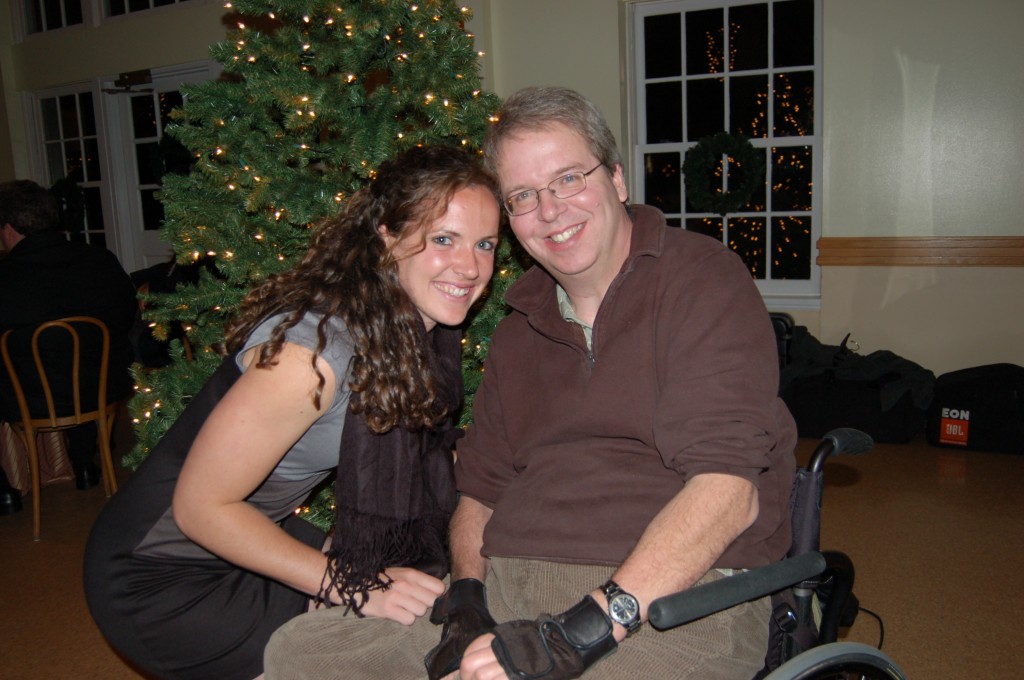In honor of National Spinal Cord Injury Awareness Month, we’ll be sharing stories from people impacted by spinal cord injuries. This includes not only the injured, but also their friends and family. Today’s post comes from guest blogger Britt Martin, co-founder of SPINALpedia.com, whose father was rehabilitated at Magee for a spinal cord injury in 1998.
My only concern when my dad was first injured was whether or not he would live.
I was told pretty early that he had broken his neck, but I had no idea what that really meant. I had no idea what the word “quadriplegic” entailed. In my 12 year old mind, my interpretation was that one day I would help my dad walk again. I envisioned him taking slow, unsteady steps as he supported himself on parallel bars. I’m pretty sure I had seen something like that on TV once, but once I learned what paralysis really meant that image was shattered.
Never walk again. The words took a while to sink in, but my pre-teen mind was already extrapolating. How are we going to play? What about the stairs in our house? How would we dance? He and I both love to dance. During those days I often thought back to us swing dancing at his wedding, him swinging me up until my feet kicked in the air. As fear started to take hold, I thought even further. If my dad couldn’t walk, how would he ever walk me down the aisle? Like so many little girls, I often envisioned that special occasion. Needless to say, I became more aware of the adaptations I was going to have to make as his daughter, the alterations in the routine and activities that directly affected my life, and my fear of the unknown.
Having lost my only brother in the accident, I was left to figure a lot of it out on my own, but I did recognize how much my dad and step-mom benefited from the mentoring of others in the hospital. The 5th floor of Magee became almost a second home with my dad’s nurses and therapists as new family members. I also found comfort in being around others who understood what we were going through.
Despite the challenges, life rolled on and I understood better the reality of my new life. I took responsibility for cleaning the screws bolted into my dad’s skull to stabilize his neck. I learned how to use a hoyer lift to help him get into bed. I even took shifts waking up at 2 a.m. to help turn him at night to avoid pressure sores. Transfers, cervical vertebrae, catheters and spasms became a part of my normal vocabulary. The things that had seemed scary at first became more normal.
As my dad transitioned home, we discovered new activities we could share and adapted the old ones we used to enjoy. Family soccer games and “roll and strolls” through the neighborhood are some of our pastimes. I also know now that my dad will roll me down the aisle, and we will certainly dance at my wedding.
What my family overcame and embraced came in a large part from those we met in similar situations who helped give us hope. However, I quickly came to realize how many people are left without that feeling of connection, of belonging. Something needed to exist to bring the entire community together. This dream became SPINALpedia.
SPINALpedia is not just for those injured—they are not the only ones who endure an absolutely life-altering change. Us able-bodied supporters carry an understanding, a connection to the disability world. We are a bridge between the able-bodied and disabled, understanding both sides of the coin, and standing in a perfect position to help bridge the gap and paint a more inclusive picture of our community. It’s imperative that those of us who have adapted our lives, who have found these connections, are available for others to also find empathy and compassion, guidance and strength to give all of us the ability to live life to the fullest.
————————————
Britt Martin is co-founder of SPINALpedia.com. She developed SPINALpedia as a side project from 2007 to June 2013. In 2013, she left her job as a teacher and coach to devote herself to SPINALpedia full time. Britt previously worked with disability communities in China as an undergrad and in Africa after graduating from Harvard University in 2008.
SPINALpedia.com is a free user-generated how-to video network for people with paralysis and their supporters to connect and learn from each other. There are thousands of videos available –from the basics (getting dressed in the morning) to the extreme (adapted skydiving)—all able to be filtered by the physical mobility of the users. Their mission is to empower more people with paralysis with the tools to adapt their lives and re-enter society as active citizens.







